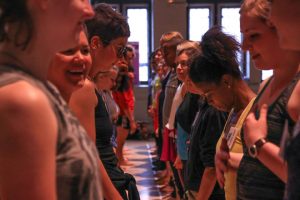HOW TO GROW GOOD HUMANS: How Dance Education is Essential to Growing a Good Human
By Arianna Dunmire

When you get 40 professional dance educators in one room you get hundreds of good answerers to the essential question: Why is dance education important? Answers run the spectrum from helping children develop cognitively, physically, and socially to teaching them curriculum. But I think the big answer that all these answers point to is that we need dance education to help cultivate good, happy people.
A few basic qualities a good human should have: happiness, health, empathy, respect, spatial awareness, intelligence, creativity, and resiliency. This list could go on and on. Here is a very brief overview of how dance education helps foster each one of these qualities.
Happiness: The ways dance education for young people fosters happiness are endless. But here are a few. Physical activity stimulates serotonin and dopamine production in the brain. These neurochemicals are what make humans feel happy. They learn how to have fun while learning. People are happy when they have fun. This also instills in them a desire to learn more (intelligence). In a good classroom students should receive lots of positive reinforcement. Positive reinforcement gives a person a sense of achievement and success and this feeling makes people, especially young people, very happy.
Health: Being physical throughout the day and getting plenty of exercise creates a healthier body and mind and instills in young people a habit of physical exercise. If we can get young people to value being strong, having good endurance, and eating good food by modeling healthy behavior and positively encouraging hard work and then they will continue to value these things as adults.
Empathy and Respect: Although these are two distinct qualities we can link them, as you need one to have the other. When people to work together in close spaces and often with physical contact, they must develop an understanding of how other people feel. We can teach this with productive partnering work and constructive conflict resolution between students. For those young people who seem to be more uncomfortable with contact and/or sharing space they might find a way to become more comfortable through a supportive community. Doing this at a very young age will help avoid more personally and socially inappropriate experiences as a person ages. For young adults contact and weight-sharing classes are a great way to teach respect and consent in physical contact. These qualities become extremely important as people become sexually active.
Spatial Awareness: This quality might not seem as important or universally desired as others on the list but is essential to successful society. With the popularization of the smart phone and the movement towards an “app for every purpose” lifestyle people have become more internally focused and less kinesthetically aware. This makes it really difficult to get around and work in a shared space with others. Giving young people the opportunity to explore their personal and general space in a physical way gives them feedback about how they should move through the world. Dance teaches how to be aware of their surroundings, how to look up and move efficiently.
Intelligence: Dance educators are trained in the human developmental patterns. With this understanding they help guide young people towards developing those patterns thus increasing body-brain connectivity. A more connected brain combined with the desire to learn makes a person more intelligent. Furthermore, the more tools a person has in order to learn besides listening and reading the more they can learn and the more they will want to learn.
Resiliency: Resiliency is the power to keep going. I’ll address this more in next week’s post about grit. For now it is important to mention that with movement education comes new challenges. It is good to challenge kids. It gives them something to work towards and a feeling of accomplishment when they finally achieve what they have been working on. It is also important for kids to fall down, which will happen all the time. Instead of coddling them, teach them how to get back up. This is a much more valuable skill for a person then seeking unproductive validation every time they think they are hurt.
In order to grow a good human we need to instill all of these qualities in them when they are young and dance education is a really effective means of achieving this.
